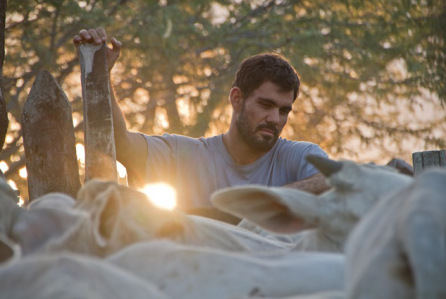NEON BULL (Boi neon)
Kino Lorber
Reviewed by: Harvey Karten, Shockya
Grade: B
Director: Gabriel Mascaro
Written by: Gabriel Mascaro
Cast: Juliano Cazarré, Aline Santana, Carlos Pessoa, Maeve Jinkings, Vinicius de Oliveira, Josinaldo Alves, Samya de Lavor
Screened at: Review 2, NYC, 3/22/16
Opens: April 8, 2016
Bullfighting was banned in Catalonia, Spain, in 2012. Computer models are available for examining frog anatomy, making dissection unnecessary in biology classes. American companies are falling over themselves, advertising that no animals were abused in the making of their products. Seaworld is under pressure to stop exploiting the services of whales and dolphins. Yet rodeos in the U.S. are still popular out west and apparently in parts of Brazil. One difference between the Texas version of rodeo and the Brazilian is that the Brazilian system harms the animal less but to this gringo looks awfully silly. As illustrated in Gabriel Mascaro’s film, which is could double as a travelogue while serving as a dramatic narrative, two men on horseback in Brazil’s cowboy country ride close together with an angry bull between them. One of the men grabs the bull’s tail, which has been carefully sanded, steers the horse suddenly to the side, and yanks the tail until the bull falls seconds later. “Bull down,” is the cry. I’ll stick with women’s basketball as my sport of choice.
This is not to say that “Neon Bull” is anything like a banal tourism movie. Writer-director Gabriel Mascaro, whose lyrical “August Winds” tracks the journey of a woman who leaves the big city to take care of her grandmother in a coastal area, wants us to look at the daily cycle of life among ranchers who drive cattle and horses from show to show. They’re people from the Northeast of Brazil (the director is from Recife) who seem content with their lives, perhaps even more so than rich folks from North America who once a year might zip down to Rio and back home to their office cubicles. Galega (Maeve Jinkings) looks after her small daughter Cacá (Aline Santana), who is daily surrounded by macho ranchers who have no problem using four-letter words in her presence. Cacá might never see the inside of a school but the outdoor life pleases her, particularly the way she kids around with the men, especially Iremar (Juliano Cazarré).
Iremar might be looked upon here in the States as a contradiction, at once a rough rancher, rubbing sand into the tails of the bulls while also dreaming of a job in the textile industry. He fashions skimpy outfits for Galega, who does exotic dances for the ranch hands wearing the mask of a horse on her head while the men whoop and holler as though low-life Americans attending a striptease show. In fact Iremar might be perfect for a Sports Illustrated swimsuit issue, showing the man attending both the sport of the rodeo and retreating to a sewing machine to design outfits.
Mascaro goes for long, arty takes, particularly when illustrating a lengthy sex scene between in a textile factory involving Geise (Samya de Lavor), who sells cologne by day and acts as a factory security guard at night. The entire operation is filmed in widescreen by Diego Garcia, giving us in the audience a stunning view of a part of Brazil’s northeast unknown to foreign tourists. With the lyricism he displayed in “August Winds,” Mascaro is intent on showing how far ahead of the U.S. Brazil is in gender politics, where a macho man in a fully heterosexual atmotphere can alternate by operating a sewing machine, dreaming not so much of furthering his hardscrabble career in the vaquejada.
Unrated. 101 minutes. © Harvey Karten, Member, New York Film Critics Online
Story – B
Acting – B
Technical – A-
Overall – B

